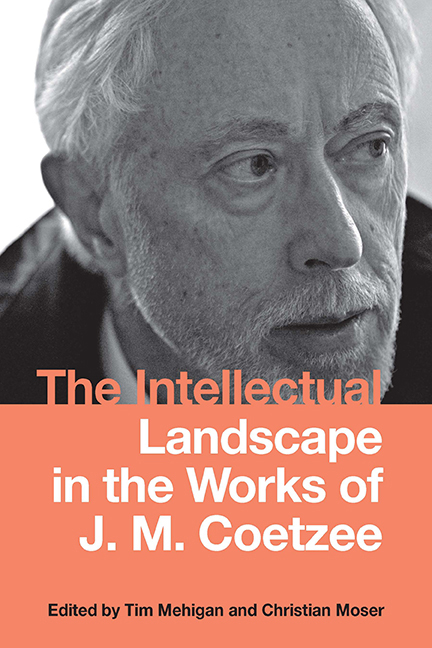Book contents
- Frontmatter
- Contents
- Acknowledgments
- Introduction: Coetzee's Intellectual Landscapes
- Part I Truth and Justification
- 1 J. M. Coetzee on Truth, Skepticism, and Secular Confession in “The Age We Live In”
- 2 Social Order and Transcendence: J. M. Coetzee's Poetics of Play
- 3 Autobiography and Romantic Irony: J. M. Coetzee and Roland Barthes
- 4 The Semantics of Barbarism in J. M. Coetzee's Novel Waiting for the Barbarians
- 5 In the Heart of the Empire: Coetzee and America
- Part II Objectivity and Communication
- Part III Convergence of Interpretative Horizons and Moral Solidarity
- Notes on the Contributors
- Index
2 - Social Order and Transcendence: J. M. Coetzee's Poetics of Play
from Part I - Truth and Justification
Published online by Cambridge University Press: 03 July 2019
- Frontmatter
- Contents
- Acknowledgments
- Introduction: Coetzee's Intellectual Landscapes
- Part I Truth and Justification
- 1 J. M. Coetzee on Truth, Skepticism, and Secular Confession in “The Age We Live In”
- 2 Social Order and Transcendence: J. M. Coetzee's Poetics of Play
- 3 Autobiography and Romantic Irony: J. M. Coetzee and Roland Barthes
- 4 The Semantics of Barbarism in J. M. Coetzee's Novel Waiting for the Barbarians
- 5 In the Heart of the Empire: Coetzee and America
- Part II Objectivity and Communication
- Part III Convergence of Interpretative Horizons and Moral Solidarity
- Notes on the Contributors
- Index
Summary
HOW DOES PLAY relate to social order? Cultural and aesthetic theories of play vary significantly in their attempts to answer this question. The gamut runs from theories that equate play with order to approaches that declare play an anarchic, transgressive quality. According to Johan Huizinga, “play creates order, is order.” From his point of view, cultural order originates as play and cannot be distinguished from it. The other extreme is marked by concepts of play that have cropped up in the wake of surrealism and the avant-garde movements: theorists such as Georges Bataille and Roger Caillois associate play with ecstasy, vertiginous intoxication, and an uneconomic excess of expenditure (“dépense”) that disrupts the structures of society and imperils its legal fabric. In between these extreme positions, there are numerous theories that ascribe to play a mediatory function. From their perspective, play either represents a different mode of order, a non-coercive alternative to the repressive order of the state, or it marks a temporary suspension of order that allows for its regeneration. The first variant is exemplified by Friedrich Schiller's famous theory of aesthetic education: Schiller envisages an “aesthetic state” (contrasting with the “dynamic state” on the one hand, the “ethical state” on the other) in which human interaction is modeled on the relationship between players in a game. Victor Turner advocates the second variant: he conceives of play as an indispensable “liminoid” element of society, a ritually sanctioned ludic breakdown of cultural order that serves the purpose of its structural renewal and restabilization.
Since play is intimately linked to concepts of order and disorder, theories of play as well as ludic practices must always engage with questions of social justice and political power, even when they pretend to restrict themselves to the aesthetic dimension of play (such as in Kantian aesthetics). The aesthetics of play necessarily implies an ethics and a politics of play. It is this interrelationship between the ethical and the aesthetic that seems to draw J. M. Coetzee to the ludic sphere. In his thoughts about play he focuses on the point where one “can no longer distinguish the ethical from the aesthetic,” to quote from his correspondence with the American novelist Paul Auster.
- Type
- Chapter
- Information
- The Intellectual Landscape in the Works of J. M. Coetzee , pp. 45 - 65Publisher: Boydell & BrewerPrint publication year: 2018
- 1
- Cited by



